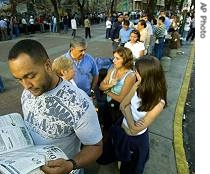2006年VOA标准英语-Venezuela's Hugo Chavez Seeking Re-Election in(在线收听)
By Michael Bowman
Caracas
03 December 2006
Venezuelan President Hugo Chavez is seeking another six-year term, as
voters go to the polls in one of Latin America's most closely watched elections. VOA's Michael Bowman reports form Caracas, Mr. Chavez faces an opposition governor from one of the country's main oil-producing states.

Venezuelans line up to vote at a polling station in Caracas, 3 Dec 2006
Early voter turnout was heavy in much of the country, with many Venezuelans gathering outside polling stations hours before they opened.
At one station in central Caracas, the line stretched for several hundred meters all the way around a large city block. Patricia Jimenez was near the head of the line when doors opened, having arrived three hours early, at 3 a.m.
She says there was never any doubt as to her vote. She says, "I like the president. I admire him. I do. As far as I am concerned, he is an incredible man."
Jimenez says she fully supports Mr. Chavez' programs aimed at helping the poor, and believes the president is using Venezuela's oil wealth to bring about a more egalitarian society.
Near the middle of the line, Fatima de Silva said she planned to vote for opposition candidate Manuel Rosales, who temporarily stepped down as governor of Zulia state to pursue his presidential bid.
She says, "I do not share the president's ideals. In eight years [of his government], he has not convinced me. When he speaks with hate and hostility, he divides the country."
Some polling stations opened late, but there were no early reports of major irregularities.
Venezuela has implemented what many observers regard as the most exhaustive set of electoral safeguards ever seen in Latin America. They include fingerprint voter identification, electronic balloting with a paper receipt and thorough vigilance of balloting by election workers, representatives of both major candidates and observers form the Organization of American States, the European Union, Mercosur, and the Atlanta-based Carter Center. More than 100,000 troops have been dispatched to provide security at 11,000 polling stations.
Election officials have a promised free and transparent vote, with absolute respect for the secrecy of the ballot. Not everyone is convinced, however, and some, like Caracas resident Jose Rodriguez, are guarded about expressing their voter preference to the news media.
Rodriguez would only discuss the kind of country he wants to live in.
He says, "I want an open and independent democracy, where we can live freely, and no one tells us how to run our lives, where there is equality, and where we are unified as a people."
President Chavez, who was first elected in 1998 and survived a 2002 coup attempt, has promised to launch a new phase of his so-called "Bolivarian Revolution" and to continue to battle what he views as the "imperialist" policies of the United States.
Barely known by many Venezuelans just months ago, Rosales has managed to unite a once-fractured opposition that boycotted legislative elections last year.
Rosales has accused Mr. Chavez, an open admirer of Cuba's Fidel Castro, of seeking to impose one-party, communist rule on Venezuela. He has also accused the president of failing to combat crime and corruption. Rosales has pledged to distribute Venezuela's massive oil revenues to the people through government-issued debit cards.
Most pre-election polls favored the president, who has predicted a "crushing" win over the opposition. Rosales has insisted that late-campaign momentum shifted in his favor and will propel him to victory.